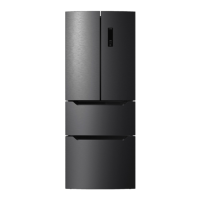1313
EN
5.6 Hints for freezing and storing frozen food
To obtain the best performance, observe the followings.
• The maximum quantity of food which can be frozen in 24 hours is shown on the rating
plate of the appliance.
• The freezing process takes 24 hours. No further food to be frozen should be added
during this period;
• Only freeze top quality, fresh and thoroughly cleaned, foodstuffs;
• Prepare food in small portions to enable it to be rapidly and completely frozen and to
make it possible subsequently to thaw only the quantity required;
• Wrap up the food in tin foil or polythene and make sure that the packages are airtight;
• Do not allow fresh, unfrozen food to touch food which is already frozen, thus avoiding
a rise in temperature of the latter.
• Lean foods store better and longer than fatty ones; salt reduces the storage life of
food;
• Water ices, if consumed immediately after removal from the freezer compartment,
can possibly cause the skin to be freeze burnt.
• It is advisable to show the freezing in date on each individual pack to enable you to
keep tab of the storage time.
• Be sure that frozen foodstuffs are transferred from the food store to the freezer in the
shortest possible time.
• Do not open the door frequently or leave it open longer than absolutely necessary.
Once defrosted, food deteriorates rapidly and cannot be re-frozen.
• Do not exceed the storage period indicated by the food manufacturer.
• Do not store bottled drink in the freezer compartment to prevent burst or other losses.
5.7 Hints for fresh food refrigeration
To obtain the best performance, observe the followings.
• Do not store warm food or evaporating liquids in the refrigerator.
• Cover or wrap the food, particularly if it has a strong avour. Wrap in polythene bags
and place on the glass shelves above the vegetable drawer.
• For safety, store in this way only one or two days at the most.
• Cooked foods, cold dishes should be covered and may be placed on any shelf.
• Fruit and vegetables should be thoroughly cleaned and placed in the special drawer
(crisper) provided.
• Butter and cheese should be placed in special airtight containers or wrapped in tin foil
or polythene bags to exclude as much air as possible.
• Milk bottles should have a cap and should be stored in the door racks.
• Bananas, potatoes, onions and garlic, if not packed, must not be kept in the fridge.

